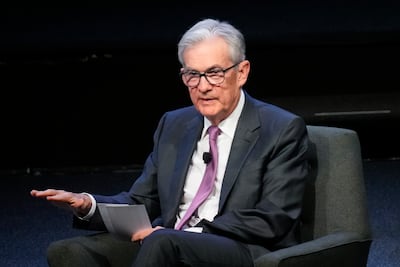The UAE Central Bank kept its benchmark interest rate steady, mimicking the US Federal Reserve’s move to maintain its policy rate for the third time this year amid a gradual drop in core inflation.
The US central bank left the federal funds rate between 5.25 per cent and 5.5 per cent at the end of its two-day meeting on Wednesday.
The rate is at its highest level since 2001, as the Fed tries to bring inflation down to its target range of 2 per cent. Consumer prices in the world’s biggest economy soared to a four-decade high in June last year.
Annualised inflation in the US fell to 3.7 per cent in September, after hitting the 9.1 per cent high in June 2022.
The Fed has kept the rates steady at its last two meetings but is widely expected to increase the benchmark narrowing rate at least once more this year to cool its economy and wage growth.
Data showed US retail sales exceeded forecasts and industrial production strengthened in September, while non-farm payroll gains have averaged 266,000 in the past three months, a robust pace.
While three and six-month measures of core inflation are running below 3 per cent, Fed chairman Jerome Powell last month warned short-term measures were often volatile.
"In determining the extent of additional policy firming that may be appropriate to return inflation to 2 per cent over time, the committee will take into account the cumulative tightening of monetary policy, the lags with which monetary policy affects economic activity and inflation, and economic and financial developments," the Fed said.
Most central banks in the GCC follow the Fed's policy rate moves due to their currencies being pegged to the US dollar, with Kuwait the only exception in the six-member economic bloc as its dinar is linked to a basket of currencies.
The UAE Central Bank maintained its base rate for the overnight deposit facility at 5.4 per cent.
The banking regulator also maintained the rate applicable to borrowing short-term liquidity from the regulator through all standing credit facilities at 50 basis points above the base rate, it said in a statement on Wednesday.
The base rate, which is anchored to the Fed's interest on reserve balances, signals the general stance of the UAE central bank’s monetary policy and provides an effective interest rate floor for overnight money market rates.
Despite higher interest rates, the UAE economy has maintained a robust growth momentum, after expanding 7.9 per cent in 2022, its biggest rise in nearly 11 years.
The Arab world’s second-largest economy grew by 3.7 per cent in the first six months of this year, driven by a sharp expansion in the country’s non-oil sector, Abdulla bin Touq, Minister of Economy, said on Monday.
The UAE’s non-oil economy grew a “staggering” 5.9 per cent in January-June this year as the country continues to pursue its diversification goals, despite stiff global economic headwinds.
Business activity in the UAE’s non-oil private sector expanded robustly in September as the addition of new clients, competitive pricing and sturdy underlying economic conditions increased demand.
The seasonally adjusted S&P Global purchasing managers’ index reading climbed to 56.7 in September, from 55 in August, setting it well above the neutral 50 mark that separates growth from contraction.

The UAE economy is forecast to expand by 3.3 per cent this year, reflecting oil production cuts agreed upon by Opec members, according to the Central Bank's latest Quarterly Economic Review.
However, Mr bin Touq on Monday said gross domestic product was estimated to grow by 3.6 per cent this year.
An array of measures adopted by the government have improved the resilience of the economy despite the challenges of inflation, monetary policy uncertainty and slowing global economic growth.
Reform efforts under the UAE 2050 strategies and progress made in comprehensive economic partnership agreements (Cepa) will boost trade and integration in global value chains and further attract foreign direct investment, according to the International Monetary Fund.
The UAE has finalised seven Cepas so far and aims to sign another 20 by the end of 2030, Mr bin Touq said.
Inflation in the Emirates – stoked by increasing energy prices, imported inflation and rising employment – was 4.8 per cent last year and is projected at 3.1 per cent and 2.6 per cent in 2023 and 2024, respectively, reflecting lower energy and food prices, the Central Bank said. That compares with a global inflation rate of 8.7 per cent last year.
Global inflation will fall to 6.8 per cent this year and 5.2 per cent in 2024, the IMF estimates.
This is still above the preferred 2 per cent target of most central banks.


